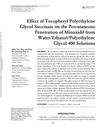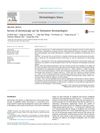 21 citations,
April 2015 in “Psychology Research and Behavior Management”
21 citations,
April 2015 in “Psychology Research and Behavior Management” Cognitive-behavioral therapy is the best treatment for hair-pulling disorder, and combining it with other therapies could improve results.
 19 citations,
October 2020 in “Biomedical Microdevices”
19 citations,
October 2020 in “Biomedical Microdevices” Derma rollers show promise for skin improvement and drug delivery, but more research is needed on their safety and effectiveness.
 17 citations,
January 2011 in “The Korean Journal of Hepatology”
17 citations,
January 2011 in “The Korean Journal of Hepatology” Vogt-Koyanagi-Harada disease can develop during interferon therapy for chronic hepatitis C.
 16 citations,
April 2021 in “International Journal of Molecular Sciences”
16 citations,
April 2021 in “International Journal of Molecular Sciences” Micro-current stimulation may promote hair growth more effectively than standard treatments.
 15 citations,
June 2006 in “Journal of Plastic Reconstructive and Aesthetic Surgery”
15 citations,
June 2006 in “Journal of Plastic Reconstructive and Aesthetic Surgery” FUT effectively treats male-pattern hair loss with high satisfaction.
 14 citations,
February 2021 in “Experimental Dermatology”
14 citations,
February 2021 in “Experimental Dermatology” Cannabinoid receptor-1 signaling is essential for the survival and growth of human hair follicle stem cells.
 11 citations,
January 2017 in “Evidence-based Complementary and Alternative Medicine”
11 citations,
January 2017 in “Evidence-based Complementary and Alternative Medicine” DA-5512 effectively improves hair growth and health, performing better than minoxidil.
 11 citations,
January 2014 in “International Journal of Trichology”
11 citations,
January 2014 in “International Journal of Trichology” Witch hazel-based hair products improved scalp irritation and were well-tolerated.
 11 citations,
January 2006 in “Drug development and industrial pharmacy”
11 citations,
January 2006 in “Drug development and industrial pharmacy” Adding TPGS to minoxidil solutions can improve skin penetration and retention, especially in water and PEG 400-based solutions.
 10 citations,
December 2019 in “International journal of medicinal chemistry”
10 citations,
December 2019 in “International journal of medicinal chemistry” Chemicals from the plant Dicerocaryum senecioides were found to safely speed up and increase hair growth in mice.
 10 citations,
June 2019 in “International Journal of Cosmetic Science”
10 citations,
June 2019 in “International Journal of Cosmetic Science” Some plant-based chemicals may help with hair growth, but more research is needed to confirm their effectiveness.
 10 citations,
November 2015 in “American Journal of Primatology”
10 citations,
November 2015 in “American Journal of Primatology” Monkeys with more anxious or inhibited temperaments tend to have less hair loss.
 9 citations,
December 2020 in “Dermatologic Therapy”
9 citations,
December 2020 in “Dermatologic Therapy” Certain drugs are effective for skin conditions like psoriasis, vitiligo, and hair loss.
 9 citations,
July 2018 in “Current Pharmaceutical Design”
9 citations,
July 2018 in “Current Pharmaceutical Design” HO-1 helps skin health and healing but can worsen melanoma; it's a potential treatment target for skin diseases.
 8 citations,
January 1996 in “Gynecological Endocrinology”
8 citations,
January 1996 in “Gynecological Endocrinology” Cyproterone acetate is the preferred treatment for women's hyperandrogenism when estrogen/progestogen use is safe.
 7 citations,
March 2019 in “Medicine”
7 citations,
March 2019 in “Medicine” Combining light therapy and microneedling shows promise for treating female hair loss.
 5 citations,
July 2020 in “Journal of Cosmetic Dermatology”
5 citations,
July 2020 in “Journal of Cosmetic Dermatology” A vibrating anesthetic device significantly reduces pain during mesotherapy for hair loss without complications.
 4 citations,
May 2020 in “PLOS ONE”
4 citations,
May 2020 in “PLOS ONE” Ingenol mebutate gel changes gene expression related to skin development and immune response in actinic keratosis.
 4 citations,
February 2017 in “Journal of Cutaneous Medicine and Surgery”
4 citations,
February 2017 in “Journal of Cutaneous Medicine and Surgery” Compounds from certain trees used by First Nations people show potential for treating skin conditions and promoting hair growth, but more research is needed to confirm their safety and effectiveness.
 4 citations,
January 2016 in “Annals of Dermatology”
4 citations,
January 2016 in “Annals of Dermatology” More severe hair loss links to thicker heart fat, suggesting possible heart disease risk.
 3 citations,
May 2020 in “bioRxiv (Cold Spring Harbor Laboratory)”
3 citations,
May 2020 in “bioRxiv (Cold Spring Harbor Laboratory)” The unique coat of lykoi cats is likely caused by new variants in the Hairless gene.
 3 citations,
July 2019 in “International journal of scientific research in science and technology”
3 citations,
July 2019 in “International journal of scientific research in science and technology” Herbal hair gel with fenugreek seed extract was found to increase hair growth.
 3 citations,
July 2015 in “Dermatologica Sinica”
3 citations,
July 2015 in “Dermatologica Sinica” About half of Taiwanese dermatologists use dermoscopy, mainly to improve diagnosis and detect cancer early, but cost and lack of training limit its wider use.
 3 citations,
January 2000
3 citations,
January 2000 Some alternative therapies for vitiligo show promise but need more research.
 2 citations,
November 2023 in “Frontiers in microbiology”
2 citations,
November 2023 in “Frontiers in microbiology” The health of the gut may be important in developing new ways to prevent, diagnose, and treat alopecia areata.
 2 citations,
September 2023 in “JMIR. Journal of medical internet research/Journal of medical internet research”
2 citations,
September 2023 in “JMIR. Journal of medical internet research/Journal of medical internet research” Machine learning can predict symptoms and quality of life in chronic skin disease patients using smartphone app data, and shows that app use varies with patient characteristics.
 2 citations,
October 2022 in “International journal of Ayurvedic medicine”
2 citations,
October 2022 in “International journal of Ayurvedic medicine” Licorice has many traditional health benefits, but more research is needed to fully support these claims.
 2 citations,
November 2021 in “Regenerative Medicine”
2 citations,
November 2021 in “Regenerative Medicine” UK stem-cell clinics often mislead about treatment safety and effectiveness, needing better regulation.
 2 citations,
August 2021 in “Journal of pharmaceutical research international”
2 citations,
August 2021 in “Journal of pharmaceutical research international” Fenugreek seed extract in a nanoparticle gel could be a promising new treatment for hair loss.
 2 citations,
April 2021 in “International Journal of Pharmaceutics”
2 citations,
April 2021 in “International Journal of Pharmaceutics” Serum formulations were better at delivering molecules to the hair bulb than nanoparticles.






























